Art of Voiceovers: Unleashing the Magic of Audiobooks
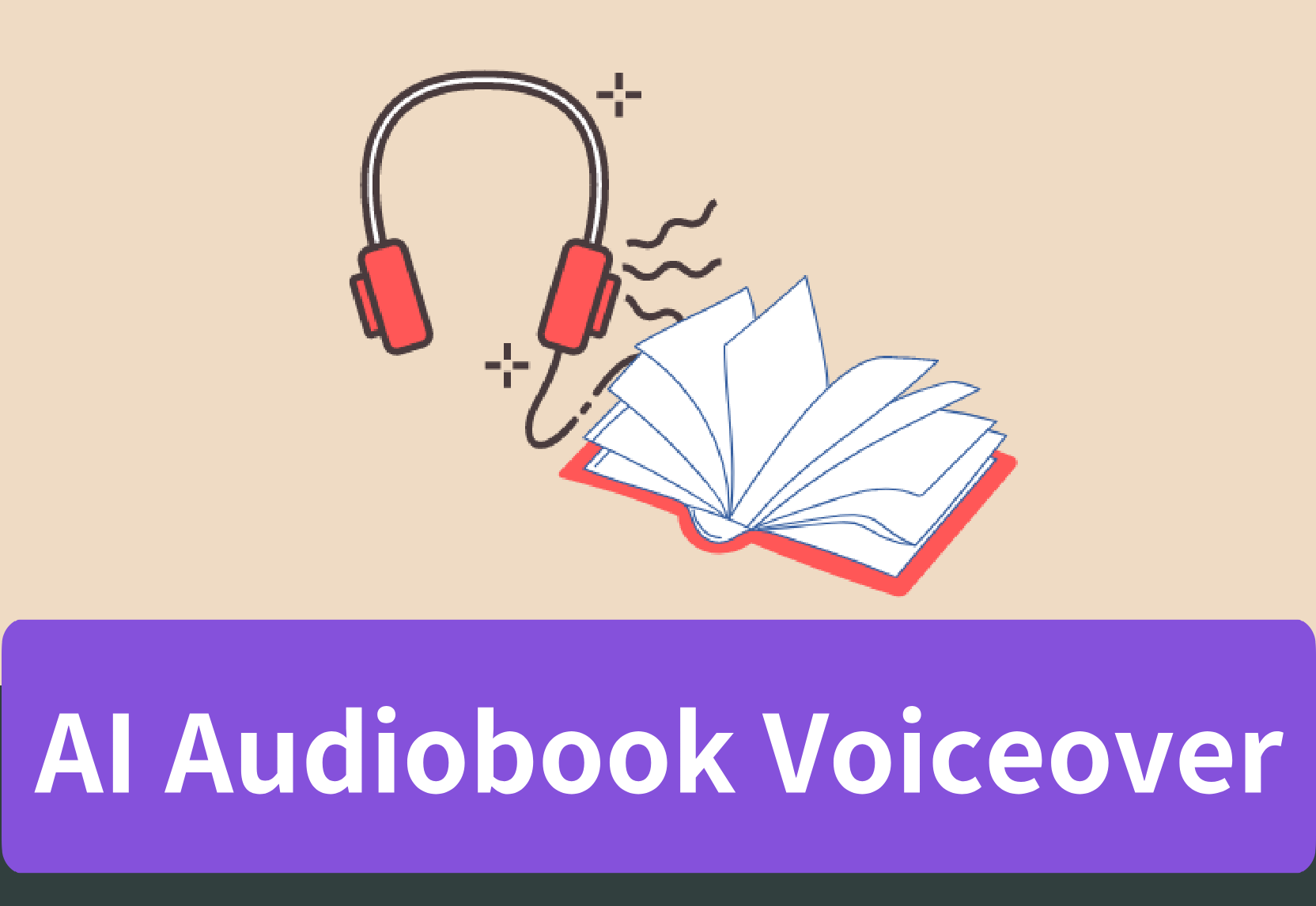
Delve into the world of voiceovers for audiobooks. Explore the transformative power of skilled narrators.
Introduction
Audiobooks have emerged as a popular medium, offering a unique and immersive experience for readers and listeners alike. Behind the scenes, talented voiceover artists breathe life into characters, transport us to different worlds, and invoke emotions. However, with the development of AI voiceover, there’s no need to cost so much in audiobooks.
In this blog, we’ll show you the comprehensive aspects of AI Voiceover for Audiobooks, including the technologies behind it and its key features. Moreover, we may also provide a detailed guide for you on how to generate your AI Voiceover for Audiobooks. Finally, we’ll explore the future development of AI audiobook voiceover. Let’s dive into the world of AI audiobook voiceover now!
AI Voiceover for Audiobooks
What is AI Voiceover?
AI Voice Over, also known as artificial intelligence voice synthesis, utilizes advanced algorithms to generate lifelike voices. This groundbreaking technology finds applications in a wide range of fields, including video narration, audio recordings, virtual assistants, and more. By harnessing the power of artificial intelligence, AI Voice Over enables the creation of highly realistic and natural-sounding voices, enhancing communication and providing new possibilities for various industries.
Technology Behind AI Voiceover for Audiobooks
The technology behind AI voiceover for audiobooks relies on advanced techniques such as deep learning and neural networks. Here are the key components:
- Text-to-Speech (TTS) Models: AI voiceover systems utilize sophisticated TTS models that convert written text into spoken words. These models are trained on vast amounts of data, including recordings of human voices, to learn the intricacies of language, pronunciation, intonation, and other speech characteristics.
- Neural Networks: Deep learning models, specifically recurrent neural networks (RNNs) or more advanced variants, form the backbone of AI voiceover technology. These networks are trained on massive datasets to capture patterns, context, and linguistic structures necessary for generating natural-sounding speech.
- Training Data: High-quality training data is crucial for building accurate and convincing AI voiceover models. This data typically includes large corpora of written text paired with corresponding human speech recordings, which are used to fine-tune the AI model.
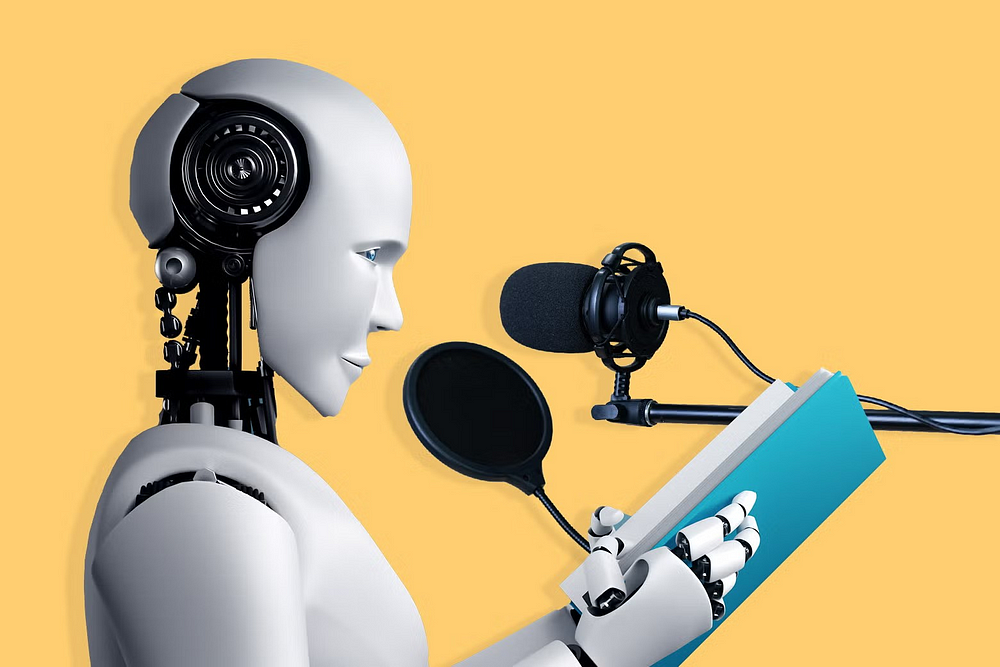
Benefits and Use Cases of AI Voiceover for Audiobooks
Benefits of AI Audiobook Voiceover
- Versatility and Efficiency: AI voiceover technology eliminates the need for scheduling and coordinating with human voice actors, reducing production time and costs. Multiple books can be narrated simultaneously, allowing for greater scalability and efficiency.
- Consistency: AI voiceovers maintain a consistent tone, pronunciation, and pacing, eliminating variations that can occur with multiple human narrators, which ensures a seamless and cohesive narrative that enhances the immersion for the listener.
- Language and Accessibility: AI voiceover technology facilitates the production of audiobooks in multiple languages, expanding the reach and accessibility of literary works, which makes audiobooks available to a broader global audience.
- Personalization: AI voiceover systems can offer customizable options to listeners, such as adjusting the speed, pitch, or accent of the narration to suit individual preferences, making it more tailored to the needs and preferences of each listener.
- Experimental and Creative Possibilities: AI voiceovers open up new creative avenues for audiobook production. These possibilities expand the boundaries of audiobook creation and offer fresh and innovative listening experiences.

Use Cases of AI Audiobook Voiceover
- Multilingual Audiobooks: By training AI models in different languages, audiobooks can be easily translated, broadening the global reach of literary works. This is especially beneficial for authors seeking to engage diverse audiences and for language learners who can access audiobooks in their target language.
- Accessible Audiobooks: AI voiceover technology enhances accessibility for individuals with visual impairments or reading difficulties. Text-to-speech capabilities enable the conversion of written content into spoken words, making audiobooks accessible to a wider range of people. This promotes inclusivity and ensures that everyone can enjoy the benefits of literature.
- Voice Customization: AI voiceover allows for customizable narration experiences. Listeners can personalize aspects such as the voice’s gender, accent, or speaking speed to align with their preferences. This customization enhances the immersive experience and caters to individual listening styles.
- Reviving Iconic Narrators: AI voiceover technology can recreate the voices of iconic narrators or authors who are no longer available. By training AI models using existing recordings or samples of their voices, their distinct delivery styles can be replicated, preserving their legacy and allowing their voices to continue captivating audiences.
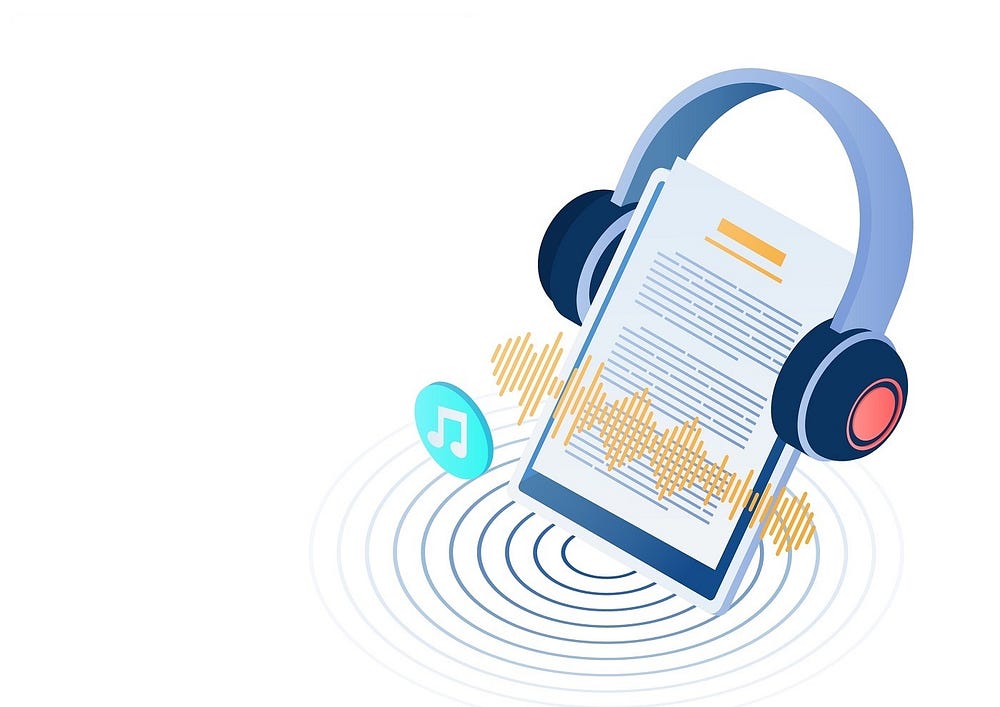
How to Generate AI Voiceover for Audiobooks
- Step 1: Launch the website of novita.ai, and create an account on it.
- Step 2: Navigate “txt2speech” under the “Product” tab.
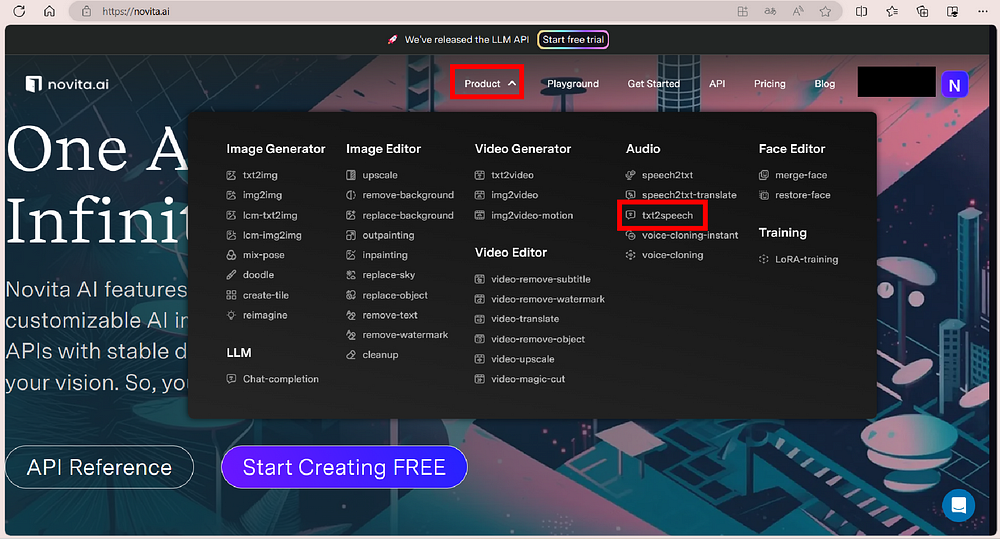
- Step 3: Enter the content of the book that you want to transform into an audiobook into the text box provided.
- Step 4: Select a voice model from the list that you want for your audiobook, which can be just a classical woman’s voice, the anime character you favorite, and even the celebrities you like.
- Step 5: Click on the “Generate” button, and wait for your audiobook.
- Step 6: Once the audiobook is complete, you can preview and make some adjustments to it. If it’s satisfied, you can download the output and share it on social media if you like.
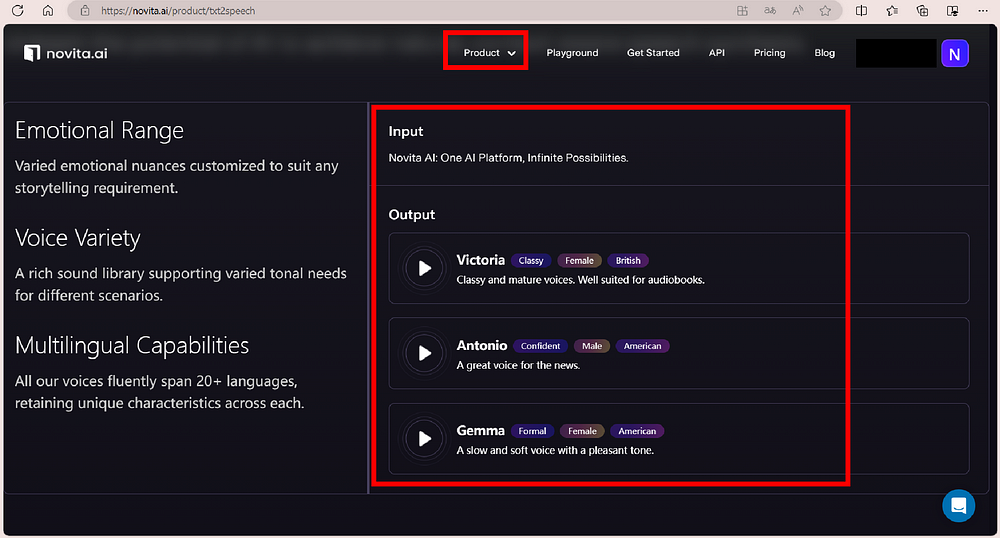
Future of AI Audiobook Voiceover
Challenges of AI Voiceover for Audiobooks
While AI voiceover for audiobooks offers numerous benefits, there are also some challenges that need to be considered. Here are a few key challenges:
- Naturalness and Emotion: Achieving truly natural and emotionally expressive voiceovers can be challenging. AI models may struggle to capture the full range of human emotions and intonation, resulting in a loss of the human touch and artistic interpretation that human narrators bring to audiobooks.
- Voice Cloning and Ethics: Voice cloning, a technique that replicates a specific individual’s voice, raises ethical concerns. Unauthorized use of voice samples or misrepresentation of voices can lead to privacy issues or misuse of someone’s identity or intellectual property.
- Training Data Bias: AI models are trained on large datasets, which can sometimes contain biases from the data sources. This can lead to biases in the generated voiceovers, including gender, accent, or cultural biases, which may impact the inclusivity and fairness of the audiobook experience.
Future Development of AI Voiceover for Audiobooks
The future development of AI voiceover for audiobooks holds promising possibilities. Here are some potential areas of advancement:
- Improved Naturalness and Expressiveness: Future developments will focus on enhancing the naturalness and expressiveness of AI-generated voices. Advancements in machine learning algorithms, voice synthesis techniques, and prosody modeling can lead to more emotionally engaging and nuanced narrations.
- Multilingual Capabilities: AI voiceover systems will further expand their multilingual capabilities. They will improve pronunciation accuracy, handle complex grammatical structures, and adapt to regional accents, making audiobooks available in a wider range of languages and dialects.
- Emotional Intelligence: AI models may be developed to recognize and portray a broader range of emotions in narrations. This could add depth and emotional resonance to the audiobook experience, making it even more engaging and immersive for listeners.
- Ethical Considerations and Bias Mitigation: Future development will address ethical concerns related to AI voiceover technology. Efforts will focus on mitigating biases in training data, ensuring consent and privacy protection, and promoting responsible use of the technology to maintain fairness and inclusivity.
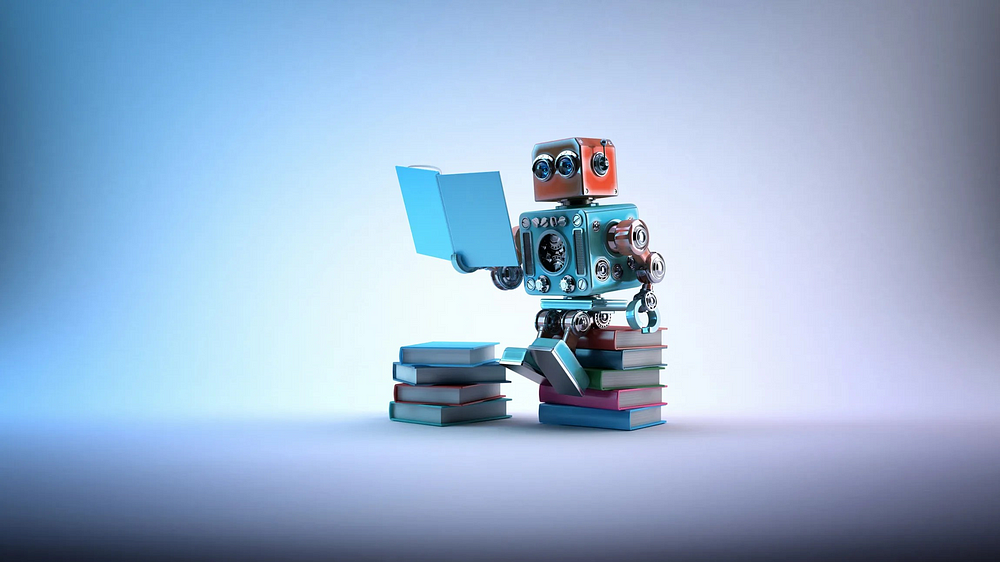
Conclusion
In conclusion, AI voiceover technology for audiobooks offers a range of benefits and exciting possibilities for the future. It streamlines production processes, enhances accessibility, and provides personalized and inclusive listening experiences. However, challenges exist, and ongoing development is still needed. Ultimately, AI voiceover technology, when thoughtfully integrated with human expertise, has the potential to revolutionize the audiobook industry, expand access to literature, and create immersive and engaging experiences for listeners worldwide.
Frequently Asked Questions about AI Audiobook Voiceover
Can I Customize The Narration Style of The Audiobook?
Yes, you can customize the options to adjust the narration, such as pitch, speed, pause, volume, emotion, and pronunciation.
Can AI Voiceovers Be Used for Different Languages in Audiobooks?
Yes, AI voiceovers for audiobooks can be generated in different languages, supporting the ability to generate audiobooks in multiple languages.
novita.ai, the one-stop platform for limitless creativity that gives you access to 100+ APIs. From image generation and language processing to audio enhancement and video manipulation,cheap pay-as-you-go , it frees you from GPU maintenance hassles while building your own products. Try it for free.
Recommended reading